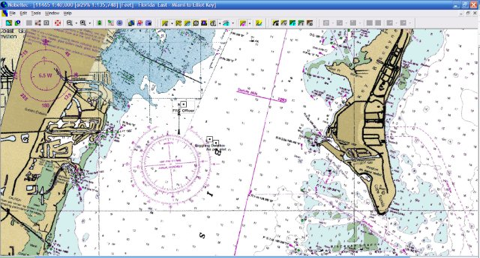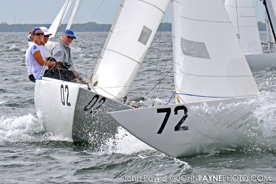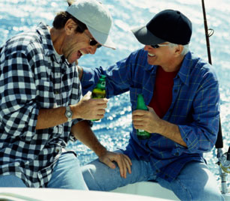INJURED OR DID A LOVED ONE DIE IN A RECREATIONAL BOATING ACCIDENT?
Help from a Florida Admiralty/Maritime Lawyer
Floridians and our visitors love the water. From the Florida coasts to the Keys, to the freshwater lakes and rivers to the inland and north, to the Caribbean, there are many opportunities in and about Florida to enjoy the water and warm weather. However, with the warm weather and presence of recreational boaters, comes the risk of accidents. Peter M. Commette, P.A. has years of experience helping people injured in recreational boating accidents. Whether you were injured tubing, jet skiing, sailing, recreational fishing or while sightseeing on a chartered boat, our firm has experience you can count on.

Recreational boating accidents may take place in a number of vessels including:
- Sailboats
- Sculls, canoes, kayaks
- Yachts
- Motor boats
- Fishing boats
- Charter Vessels
- Personal watercraft, including jet skis, waveriders and waverunners
- Windsurfers, kite boards and parasail boats
- Surfboards

Peter Commette and his staff have obtained payment for medical bills, past and future pain and suffering, past and future lost wages, impairment of earning capacity and other costs of a recreational boating accident caused by:
- Drunk boating
- Excessive speed
- Lack of or improper navigational lights
- Defective or missing equipment
- Operator error or inexperience of operator
- Hit and run
- Traveling at a high rate of speed
- Producing a wake in a no-wake zone or producing excessive wake for conditions
- Overcrowding
- Collisions and allisions with other vessels
- Collisions with rocks, docks, jetties, piers and sandbars
- Operating in poor and/or rough weather conditions
- Sinking
Accidents on recreational watercraft can leave you with serious injuries including fractured vertebrae; traumatic brain injuries; spinal cord injuries; back and neck injuries that could lead to paralysis; herniated discs; broken bones and even death.
Why Hire an Admiralty/Maritime Attorney?
It is important to determine the relevant laws after a recreational accident. Recreational boating accidents can be complicated. There may be little or no insurance coverage. It may be difficult to prove negligence. The applicable laws vary depending on where the accident occurred: did it take place on a lake, on navigable international waters, or on state waters closer to shore? Was defective equipment involved? Matters such as these require the scrutiny of an experienced maritime law attorney who can identify the right laws under which to file claims for compensation and who knows how to properly investigate the claim to obtain maximum compensation.
The Limitation of Liability Act Affects the Unwary Passenger
The Limitation of Liability Act is a potential trap for injured maritime claimants. If it is a boat that caused the injury, then your problems multiply, while your chances of just compensation for your injuries diminish. One of the unique aspects of maritime law is the ability of a shipowner, boat owner, or waverunner/jet ski owner to file a lawsuit to limit the vessel owner’s liability to the value of the ship plus pending freight at the end of the voyage. If a vessel sinks or has little value after a catastrophic accident, this means the vessel owner’s responsibility can be limited to little or nothing. The Limitation of Liability Act can be traced back to an English statute enacted in 1734, well before corporate ownership and insurance were available to protect shipowners and at a time when Modern ships were out of the control of their shoreside owners; a shipowner who properly equipped and crewed a ship shouldn’t be liable for something that happens when the ship is out of his control. It was intended to encourage investment in the shipping industry. The reasons for having this law no longer exist, but the Limitation of Liability Act remains.
“The captain went down with the ship, but the chairman escaped with his life – and fortune – intact.” — Old saying about the Titanic; sound familiar?
An example of the use of the Limitation of Liability Act is the sinking of the Titanic on April 12, 1912. Even though the Titanic had never been to the United States, upon her sinking, the owners rushed into the federal courts in New York to file a limitation of liability proceeding. The Limitation of Liability Act provides that if an accident happens due to a circumstance which is beyond the privity (direct contract relationship) and knowledge of the ship’s owner, the owner can limit his liability to the value of the ship after it sinks. With the Titanic, the families of the deceased passengers, and the families of the surviving passengers who lost their personal belongings, were limited to splitting $95,000, the value of the remaining lifeboats and pending freight; the value of the Titanic after it sank was zero. Worse yet, as I hinted in the beginning of the above paragraph, The Limitation of Liability Act doesn’t just apply to large ships. It can be used to insulate motorboat and sailboat owners from liability when the boat is loaned to another who then has an accident with someone else aboard. Even waverunner and jet ski owners have been able to successfully utilize the Limitation of Liability Act to insulate themselves from liability.
Click here for a fascinating letter written on August 23, 1912, just four short months after the Titanic sank. The letter was written by the lawyers for insured cargo interests regarding the issues surrounding recovery of their losses from the cruise line. My father, a maritime lawyer who practiced for over 50 years in New York City, came into possession of it, when a friend sent it to him in the 1990’s for a good read. It is a very good read. The letter is a masterful piece of legal evaluation, anticipating most all of the legal arguments and blocking tactics, like Limitation of Liability, that would be employed by the cruise line. The appeals went all the way to the U.S. Supreme Court, resulting in a decision authored by Justice Oliver Wendell Holmes, reversing the decisions of all the lower courts. He and the majority of the court viewed the matter of which country’s law for the court to apply as procedural in nature and concluded that judicial procedures should be determined by the law of the nation in which each court sits, in this case, the United States. Therefore, the Supreme Court ruled that, in virtually all cases involving foreign flag vessels or non-U.S. shipowners, Limitation of Liability proceedings may be commenced in the United States, and the proceedings will be governed by U.S. maritime law, regardless of the flag or ownership of the vessel on behalf of which the limitation petition was filed. Take time to read the letter; it is that very good read my father was promised, and it underscores the next tragedy facing those injured or who have lost loved ones in a ship disaster.
Avoiding the Limitation of Liability Act for the Passenger
Unscrupulous owners can be stopped from circumventing justice, but it isn’t easy, and it’s near impossible for a non-maritime attorney. Limitation of Liability actions can be difficult and procedurally challenging, with short time periods to file a claim. Cases brought in state court can be removed to federal court, if the owner timely files a Limitation of Liability Action in response to the claim. If the ship owner has petitioned the court to limit its liability, you must act quickly. The Limitation of Liability Act normally imposes a very quick deadline to file both a response to the vessel owner’s lawsuit and a claim for your damages.
Peter Commette and his staff at Peter M. Commette, P.A. have successfully prevented Limitation of Liability lawsuits from limiting recovery by anticipation and tactics, and by filing the appropriate pleadings and stipulations to allow our clients to proceed with their personal injury lawsuits. In these cases, we have secured compensation for injured clients even when the vessel was at the bottom of the ocean.
Death on the High Seas Act (“DOHSA”) and the Passenger
If a death is involved in a maritime setting, then the problems multiply. Remedies for wrongful death on the high seas are governed by the Death on The High Seas Act (“DOHSA”), a Federal statute enacted in 1920. DOHSA is found at 46 U.S.C. Sec. 30301 through 30308. This statute provides for wrongful death remedies on the “high seas”. These remedies are limited to pecuniary damages, that is, the economic loss to the estate.
The common law provides wrongful death remedies on navigable waterways not the high seas. The U.S. Supreme Court has held that the common law damages included not only loss of support, but also loss of the companionship and society of the decedent, and a survival action for the pain and suffering of the decedent. However, the Supreme Court has confined the common law wrongful death remedy to cases in which the measure of damages is not governed by a federal statute such as DOHSA. DOHSA, when it controls, is not your friend. The economic damages only rule under DOHSA is not in line with the wrongful death remedies of most states or with the common law referred to above. Most states’ wrongful death remedies provide for recovery not only of the economic contributions of the decedent but also for the pre death pain and suffering of the decedent; for the loss of companionship, guidance, and consortium of the “survivors”; and for the grief of the “survivors.” In limiting the estate to economic damages, DOHSA limits the rights of those bereaved and left behind. In the right circumstances, DOHSA can be avoided in a maritime wrongful death case, but this takes the right set of circumstances and the right, knowledgeable admiralty/maritime attorney to know how to navigate this maze of overlapping federal statutes and law.

Boating Under the Influence of Alcohol or Drugs
Peter M. Commette, P.A., Helping Injured People Pursue the Maximum Available Compensation when hurt by Someone Operating a Boat while Under the Influence of Alcohol or Drugs If you’ve been injured in an accident caused by someone who was operating a boat or ship under the influence of alcohol or drugs, you may be entitled to punitive damages in addition to compensation for your medical bills, lost wages, pain and suffering, and other damages. Boating under the influence of alcohol or drugs is just as dangerous as, if not more dangerous than driving while intoxicated. Unfortunately, it happens all too often, and those who engage in this reckless behavior deserve to be held accountable for the consequences of their actions.
Holding the Responsible Parties Accountable for Reckless Behavior
At Peter M. Commette, P.A., we have extensive experience obtaining fair compensation for victims of accidents caused by boating under the influence. We handle cases throughout Florida and beyond.
Do I Have a Good Admiralty/Maritime Case? What is My Admiralty/Maritime Case Worth? What is the Value of my Admiralty Maritime Case?
The best way for us to answer these questions is to learn enough about your case so as to be able to decide and advise you. One free consultation phone call is usually enough to tell us whether your case is strong enough for us to pursue. In order to best maximize your call, gather relevant documents such as accident reports, insurance policies, and information about the person, company or group that caused the injury, and then give us a call. In the event your injuries prevent you from traveling to our office, we can make home or hospital visits as necessary. We usually follow up that call with a no-obligation, no cost, review of your medical records, along with other potentially relevant documents. The reality, though, is that each case is different and no lawyer can precisely predict the value of a particular case, especially at its early stages. However, due to our extensive experience in admiralty/maritime injury cases, we typically are able to provide a good estimated value range for each case after we have gained familiarity with it.
Why Hire Peter M. Commette, P.A.?
Peter Commette is an experienced maritime attorney and has spent his life on the water. Mr. Commette grew up on, in and around sail and motor boats on Barnegat Bay, New Jersey. He was a boat builder, a sailmaker and a collegiate sailing coach, before going to law school. Mr. Commette also represented the United States in the Olympics in sailing; he was a medalist for the U.S. in the Pan-American Games and is a world champion sailor. Mr. Commette has a life-long passion for understanding the basic mechanics of all boats. With his understanding of and respect for the sea, he brings unique skills to the table for you, with a network of experts built up from a lifetime of boating experience around the country and the world. Mr. Commette’s knowledge is so extensive that, more than once, another lawyer has asked Mr. Commette to help to testify as a witness in a boating lawsuit. At Peter M. Commette, P.A, we have years of proven experience. Whether you suffered an injury in a boat on a lake, or in the middle of the Atlantic Ocean, Gulf of Mexico, or Biscayne Bay, Peter Commette and his Florida maritime staff at Peter M. Commette, P.A. can help you. Contact us today for a free consultation. With more than 25 years of experience, you can feel confident in our abilities. We represent clients nationwide.
